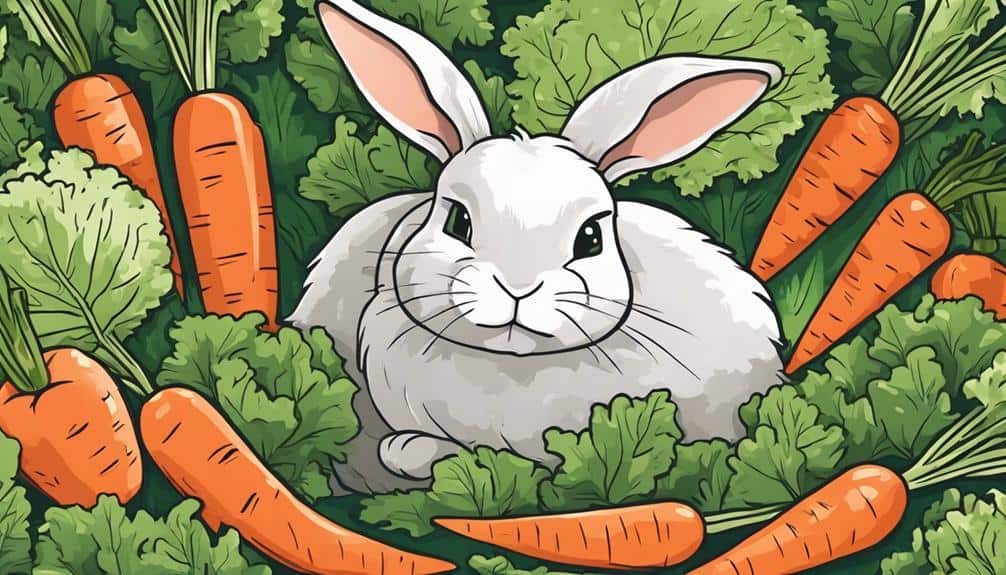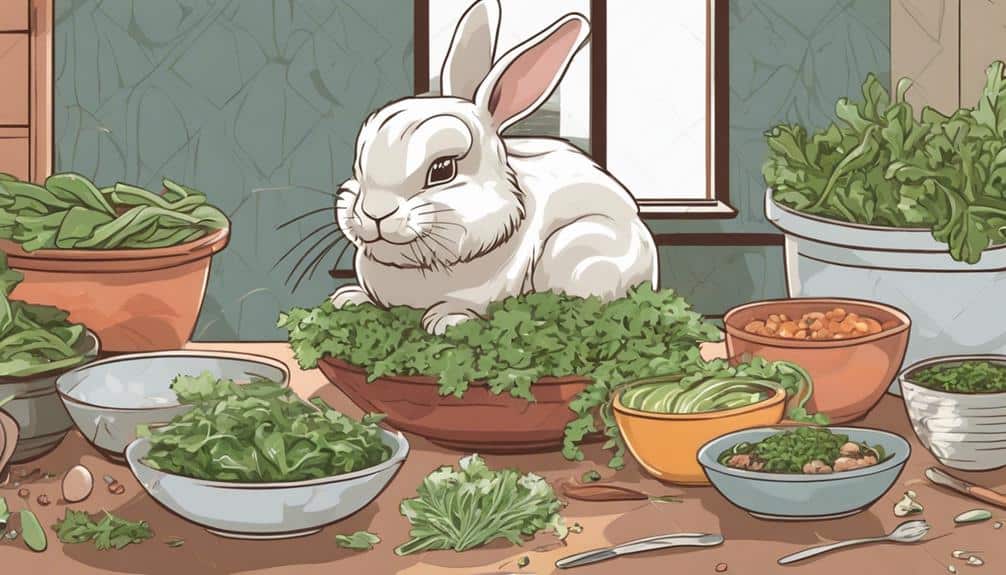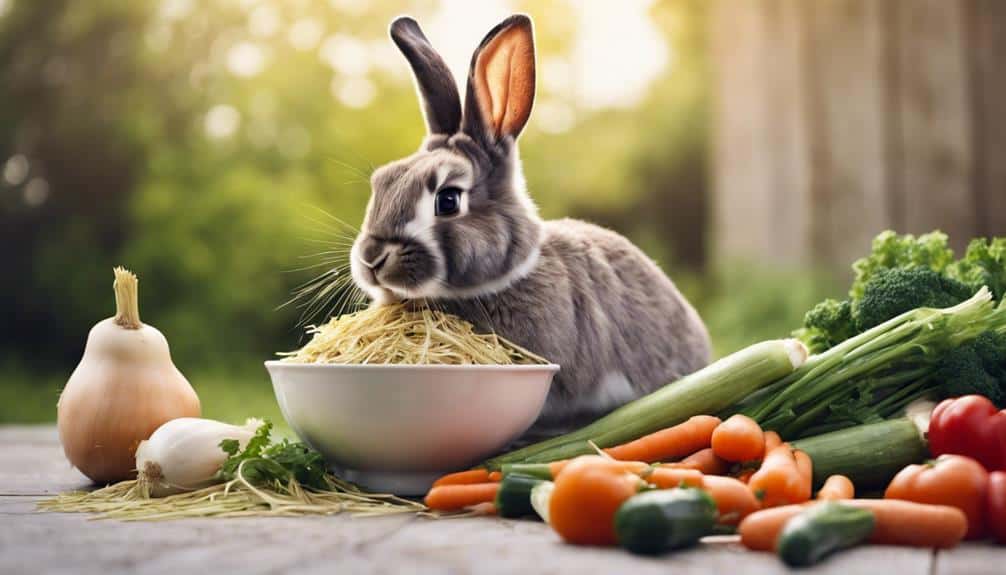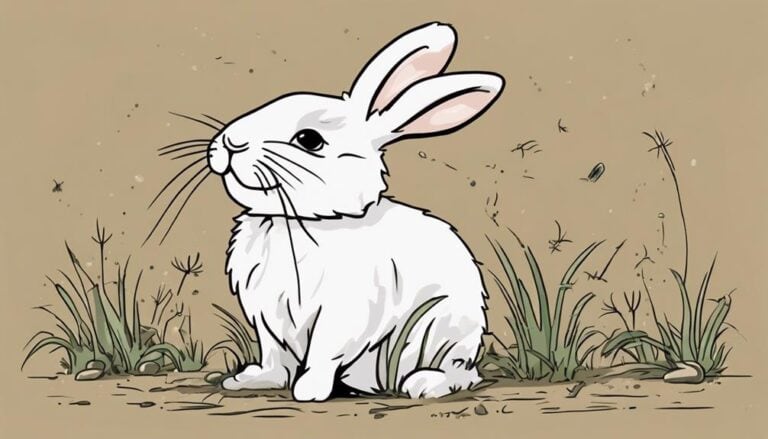Imagine a fluffy bunny happily nibbling on fresh greens, their whiskers twitching with each bite. But do bunnies truly know when to stop eating?
While their constant need to chew is essential for their well-being, some rabbits might struggle with regulating their food intake. Understanding how bunnies manage their appetite and the signs that indicate they've had enough can be vital for ensuring their health and happiness.
So, how can you help your adorable pet maintain a balanced diet and prevent potential overeating issues?
Contents
- 1 Key Takeaways
- 2 Bunny Eating Instincts
- 3 Understanding Rabbit Appetite Control
- 4 Signs of Bunny Satiety
- 5 Overeating Risks for Bunnies
- 6 Feeding Guidelines for Rabbits
- 7 Rabbit Food Intake Patterns
- 8 Prevention of Rabbit Overeating
- 9 Healthy Eating Habits for Bunnies
- 10 Frequently Asked Questions
- 11 How Does Hay Consumption Affect a Bunny’s Eating Habits?
- 12 Conclusion
Key Takeaways
- Rabbits instinctively self-regulate food intake for health and well-being.
- High-fiber hay supports natural appetite control in bunnies.
- Observing behavior cues like relaxed posture indicates satiety.
- Overeating risks, like obesity and digestive issues, can be prevented with mindful portion control.
Bunny Eating Instincts

Rabbits instinctively regulate their food intake to maintain balance and prevent health issues related to overeating or undereating. Understanding the intricacies of the rabbit digestive system is important in ensuring they receive a healthy diet.
Hay plays a significant role in a rabbit's diet as it aids in proper digestion and prevents gastrointestinal issues. Providing hay throughout the day mimics their natural grazing behavior, keeping their digestive system functioning at its best.
In addition to hay, pellets are a common food source for rabbits. These pellets are specially formulated to meet their nutritional needs. However, monitoring the amount of pellets given is necessary to prevent overeating. Some rabbits may have a tendency to overindulge in pellets if not regulated.
Understanding Rabbit Appetite Control
Understanding how rabbits naturally regulate their food intake is essential for ensuring their overall health and well-being. Rabbits possess a unique digestive system that necessitates constant munching to maintain the best gut health. Healthy rabbits have an innate ability to self-regulate their food intake, stopping when they've consumed enough.
However, overeating can pose significant risks to rabbits, such as obesity and digestive problems, ultimately affecting their well-being. To support a rabbit's natural appetite control, it's vital to provide unlimited access to high-fiber hay. This type of diet not only aids in maintaining proper weight but also promotes healthy digestion.
Monitoring a rabbit's diet, weight, and behavior is key to ensuring they're eating appropriately and avoiding overeating. By understanding and respecting a rabbit's natural tendencies to regulate their appetite, you can help them lead a healthier and happier life.
Signs of Bunny Satiety
You can recognize when your bunny is full by observing their behavior after eating. Look for signs like resting, walking away from food, or refusing treats as indicators of satiety.
Satiety Indicators
When observing bunnies for signs of satiety, it becomes evident that they exhibit cues like a relaxed body posture and a slowing down of chewing to indicate that they have had enough to eat. Bunnies may also show disinterest in food, turn away from the food, or leave food uneaten when they are satiated. Monitoring their behavior post-feeding, such as observing signs of grooming or resting, can also signal that they have reached their satiation point. Additionally, bunnies might pause between bites, take breaks, or move away from the food bowl when they are full. Keeping an eye on a bunny's weight and overall health is vital in determining if they are maintaining a healthy food intake level.
| Satiety Indicators | Description | Importance |
|---|---|---|
| Relaxed body posture | Indicates satisfaction | Ensures well-being |
| Slowing down of chewing | Signals contentment | Promotes health |
| Disinterest in food | Shows satiation | Prevents overeating |
Recognizing Fullness
Recognizing signs of fullness in bunnies involves observing their behavior for cues such as a relaxed body posture, slowing down or pausing while eating, and a decreased interest in food.
Bunnies may stop actively seeking more food or leave some uneaten when they're important. Monitoring your bunny's eating habits is vital to make sure they stop when full, preventing overeating and associated health issues.
Including leafy greens in their daily diet, which are high in fiber, can help promote a healthy digestive system and regulate their food intake. By paying attention to these indicators and providing a varied diet with the right balance, you can support your bunny's well-being and help them maintain a healthy weight.
Overeating Risks for Bunnies
Bunnies face significant risks when it comes to overeating, including potential digestive health concerns and the risk of obesity. It's crucial to exercise caution with their diet, offering appropriate portion sizes to prevent these issues.
Digestive Health Concerns
To maintain your bunny's digestive health, vigilance against overeating is essential due to the serious risks it poses, such as obesity-related health complications. Here are important points to keep in mind:
- Weight Monitoring: Regularly check your rabbit's weight to detect any sudden changes that could indicate overeating.
- Portion Control: Make sure your bunny is receiving the right amount of food to prevent overeating and subsequent health issues.
- Avoid High-Calorie Treats: Be cautious with treats as they can contribute to overeating and weight gain, leading to digestive complications like tooth decay.
Obesity Dangers
Maintaining a balanced diet for your rabbit is important to prevent serious health risks associated with obesity, such as heart disease and digestive complications. Overeating puts your bunny at risk of developing obesity-related health issues, impacting its quality of life.
Digestive complications from overeating can lead to significant discomfort and may require medical attention. As responsible rabbit owners, monitoring your pet's diet is essential to prevent these dangers.
Portion Control Tips
Effective portion control for your rabbit involves understanding their unique digestive needs and providing a balanced diet to prevent overeating risks. To help your bunny maintain a healthy weight and digestive system, consider these essential tips:
- Feed Small Amounts: Offer food in controlled portions to prevent overeating.
- Provide a Balanced Diet: Include a mix of hay, vegetables, and pellets to make certain your rabbit gets the nutrients they need.
- Monitor Constant Munching: Watch for signs of excessive eating and adjust portion sizes accordingly to promote a healthy diet.
Feeding Guidelines for Rabbits
When it comes to feeding your rabbit, it's important to understand their natural eating habits and nutritional needs to protect their well-being and prevent health issues. Rabbits have a unique digestive tract that requires them to be munching consistently throughout the day. Providing a balanced diet is critical to maintain their health and prevent issues like gastrointestinal stasis. Here are some feeding guidelines to follow:
| Feeding Guidelines for Rabbits | Description |
|---|---|
| Small and Daily Meals | Offer small amounts of food multiple times a day to mimic their natural eating patterns. |
| Leafy Greens | Incorporate a variety of leafy greens like kale, parsley, and cilantro into their diet for essential nutrients. |
| High-Fiber, Low-Fat Diet | Provide hay as the staple of their diet, as it is high in fiber and low in fat to promote healthy digestion. |
| Limited Pellets | Limit pellets to about a quarter cup per day to prevent obesity and make sure they are getting a balanced diet. |
Rabbit Food Intake Patterns

Rabbits exhibit natural grazing tendencies, often pausing their food intake when satisfied or at rest. Understanding the patterns of rabbit food intake is important for their well-being. Here are some key points to take into account:
- Consistent Grazing: Rabbits tend to eat consistently throughout the day, nibbling on small amounts of food. This behavior mimics their natural inclination to graze in the wild.
- Baby Bunnies' Needs: Baby bunnies have higher energy requirements and may need to eat more frequently. They typically consume about a quarter cup of pellets per pound of body weight daily.
- Importance of Fiber: Providing fiber-rich foods like Alfalfa hay is essential for a rabbit's digestive system. Their system is constantly moving and requires a high-fiber diet to function properly.
Understanding these intake patterns can help you make sure that your bunny stays healthy and happy. Some bunnies will naturally stop eating when they've had enough, while others may need monitoring to prevent overeating and potential health issues.
Prevention of Rabbit Overeating
To promote the best health in your rabbit, ensuring mindful food consumption is essential to prevent overeating and associated health risks. Rabbit care involves implementing strategies like portion control, monitoring weight, and regulating food intake to prevent obesity and promote digestive health. High sugar foods, such as pellets or treats, should be limited to avoid weight gain and other related issues. Offering a balanced diet with a focus on hay, fresh vegetables, and controlled pellet intake can help maintain a healthy weight and prevent overeating tendencies in rabbits. Constant munching is a natural behavior for rabbits, but as an owner, it's important to make sure they are not consuming excessive amounts of food. By monitoring their weight regularly and implementing food regulations, you can help your rabbit maintain a healthy lifestyle. Below is a table summarizing key points to prevent rabbit overeating:
| Key Strategies | Description | Benefits |
|---|---|---|
| Portion Control | Limiting the amount of high-calorie foods to prevent overeating | Prevents obesity |
| Balanced Diet | Offering a variety of hay, vegetables, and controlled pellets intake | Supports digestive health |
| Monitoring Weight | Regularly checking your rabbit's weight to make sure a healthy range | Helps prevent health issues |
Healthy Eating Habits for Bunnies

Encouraging healthy eating habits in your rabbit involves understanding their unique digestive needs and promoting a balanced diet to support their overall well-being. To make certain your bunny maintains peak health, follow these essential guidelines:
- Provide Unlimited Hay: The digestive system of rabbits is constantly moving, and hay helps keep it healthy. Make sure your bunny has access to unlimited hay at all times to support their digestive health.
- Incorporate Leafy Green Vegetables: While rabbits tend to enjoy sugary treats, it's important to keep high-sugar foods limited. Instead, offer a variety of leafy green vegetables to provide essential nutrients without the added sugars.
- Offer Fresh Water and Keep Teeth Trim: Make sure your rabbit always has access to fresh water to stay hydrated. Additionally, provide appropriate items for chewing to help wear down their teeth, as rabbits' teeth continue to grow throughout their lives.
Frequently Asked Questions
Can You Overfeed a Bunny?
You can overfeed a bunny if you don't watch their portions, monitor their weight, limit treats, guarantee hay quality, maintain a balanced diet, control food availability, meet exercise needs, care for their digestive health, and prioritize dental care.
Does Rabbit Know When to Stop Eating?
You trust your rabbit's instincts to guide their appetite regulation. Food cues, dietary awareness, and satiety signals play a role in their feeding behavior. Sensory perception and digestive capacity help them navigate environmental factors for balanced eating.
Do Rabbits Need to Eat Constantly?
Rabbits need to eat constantly due to their unique digestive system. Feeding schedules, portion control, and monitoring grazing behavior are key for weight management. Recognizing hunger signals, maintaining digestive health, and managing treat temptations are essential.
Do Rabbits Go Through Phases of Not Eating?
Sometimes, rabbits experience periods of not eating due to various reasons like digestive issues, stress, or illness. Monitoring their appetite and behavior is important. Seeking veterinary care promptly can address underlying health concerns and secure their well-being.
How Does Hay Consumption Affect a Bunny’s Eating Habits?
Hay for bunny’s diet is crucial for a rabbit’s health. It aids in digestion and keeps their teeth trimmed. Overconsumption of hay can lead to obesity, while too little can cause dental issues. It’s essential to monitor and regulate hay intake to maintain a balanced diet for bunnies.
Conclusion
You can help your bunny maintain a healthy diet by monitoring their eating habits closely.
Remember, some bunnies may struggle with knowing when to stop eating, so it's important to provide a balanced diet to prevent issues like obesity and digestive complications.
Did you know that approximately 80% of pet rabbits are at risk of overeating?
By offering a variety of fresh vegetables and hay, you can guarantee your adorable pet stays happy and healthy.






